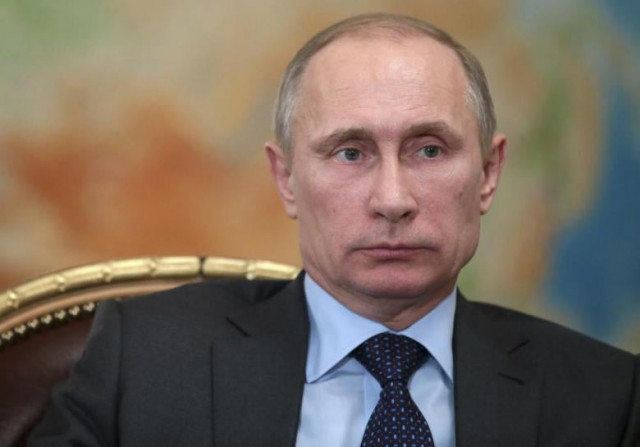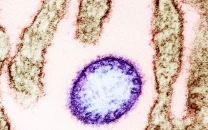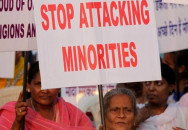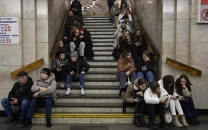Russian students face lectures over anti-Putin views
Authorities in Russia appear to be getting jittery over youth discontent ahead of presidential elections

PHOTO: REUTERS
But instead his teacher launched a stinging verbal attack against him for attending an anti-Kremlin protest in a special lecture on the dangers of 'extremism' in the country.
"Fascist", "lackey of the Anglo-Saxon nations" and 'traitor' -- the teacher did not mince his words in blasting the 18-year-old student for joining an anti-corruption rally in March organised by top opposition leader Alexei Navalny.
Putin wishes his former KGB boss happy birthday
"In front of the whole class, he said that it was his job to make sure my classmates didn't turn out like me," said Chaikovsky, who secretly filmed the lesson at his school in the city of Tomsk and posted it online.
"It was unethical. He wanted to humiliate and intimidate me."
Chaikovsky told his headmistress about the lesson but she dismissed it on local television as "simply a teacher's hysterical reaction."
This, however, is no isolated case as authorities in Russia appear to be getting jittery over youth discontent ahead of presidential elections next year. Numerous schools and universities have held classes or lectures attacking Navalny after thousands of his supporters took part in the nationwide protests on March 26 in the biggest show of anger against President Vladimir Putin in years.
Striking about the demonstrations were the large numbers of school pupils and students present who have grown up under Putin's nearly 18 years in power and were willing to risk detention to voice their anger.
"I'm really happy that a generation has been born in the country who want to be citizens, who aren't afraid," Navalny said in court, a day after being detained at the Moscow protest.
Across the country students have reported being press-ganged into lectures warning them of the perils of supporting those opposed to Putin.
In the Volga city of Samara, more than 3,000 students were last month forced to attend a lengthy conference titled "No to extremism!", where speakers warned the March protests could turn into an armed movement, a person who attended told AFP.
One of the speakers told students that "to fight extremism" they must support the region's governor Nikolai Merkushkin from the Kremlin's ruling party, whom Navalny has accused of corruption.
At another event in the city, priests lectured students on the dangers of "revolutionary movements," citing the "collapse of the country" after the Russian Revolution in 1917, one of the students told the opposition movement Open Russia.
In Russia's second city of Saint Petersburg, students at the Polytechnic University also had to attend a similar conference and fill in a questionnaire, a local journalist told AFP.
‘Putin is planting deep sea nukes to trigger tsunami in US’
"Are you willing to help police? What is your attitude to extremists? Do you think that the media foment extremism?" said the questionnaire, obtained by AFP. But the attempts to reeducate the youths sometimes appear to backfire.
In the city of Vladimir, 180 kilometres (112 miles) from Moscow, cell phone footage emerged showing university students challenging lecturers after they were forced to watch a film accusing Navalny of being a 'fascist'.
"Why are you scaring us with war and revolution?" shouts one student before others raise examples of high-level corruption and demand to be shown opposition videos.
Andrei Rudoi, a history teacher in the town of Dzerzhinsk, around 450 km east of Moscow, has witnessed a rise in political engagement among his students -- and says authorities seem keen to tamp it down.
"I've seen this in my teaching. Over the last year, more and more of my students have started talking about politics," Rudoi told AFP.
"They are debating more, they go to meetings and take part in political groups -- and that makes the authorities afraid," the 26-year-old teacher said.
"Whether at national or regional level, there must have been an order issued to calm school and university students down."
Some schools and universities have simply tasked teachers with persuading their students not to go to protests.
In the southern town of Volzhsky, one school pupil recounted how they were supposed to have an IT lesson but the teacher said that, instead, they would discuss the importance of political stability in Russia.
"I talked about Navalny and the teacher started getting really stressed," the 13-year-old told AFP. "She was lecturing us for an hour about morality and we got really bored."
"They don't have the right to 'reeducate' us, to change our political views," he said. "I think they're doing this because they're afraid. They know that one day we'll be able to vote."



















COMMENTS
Comments are moderated and generally will be posted if they are on-topic and not abusive.
For more information, please see our Comments FAQ